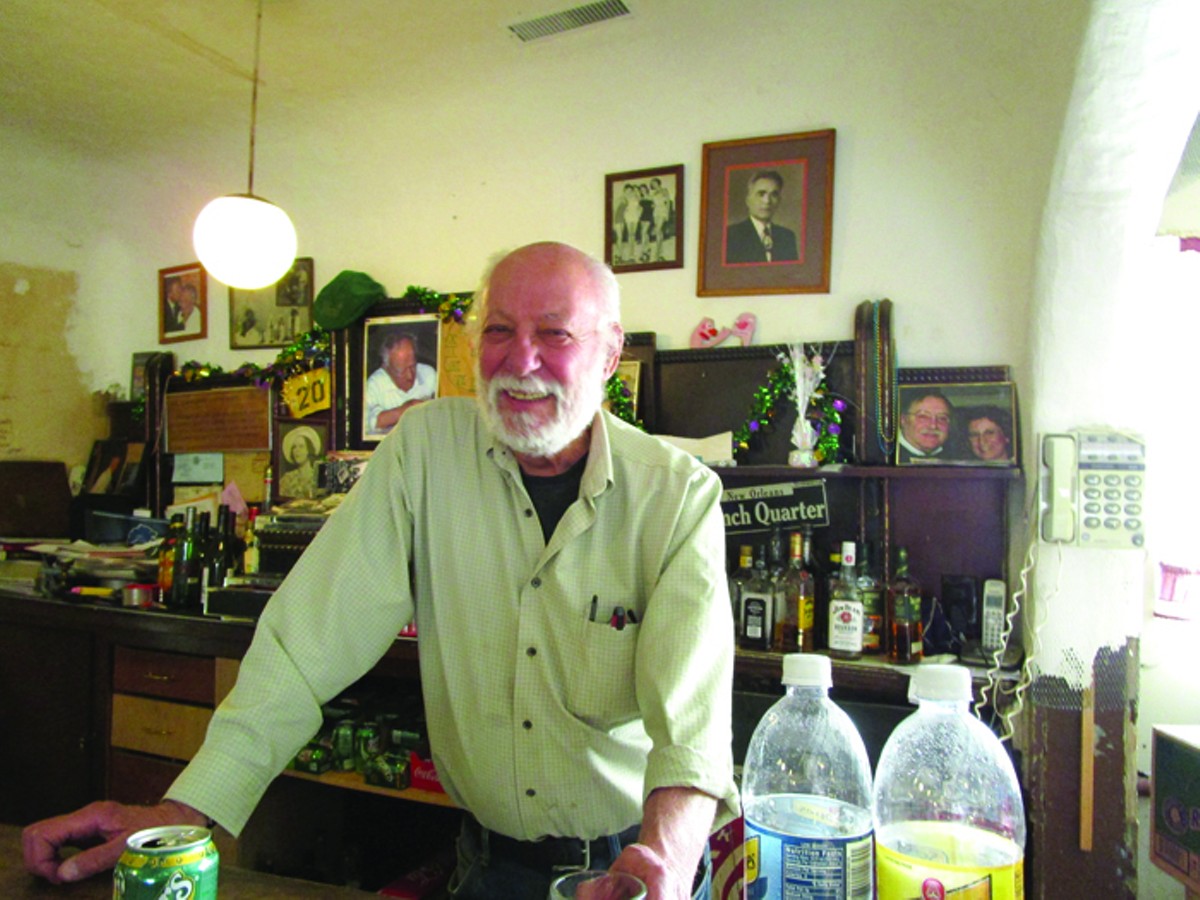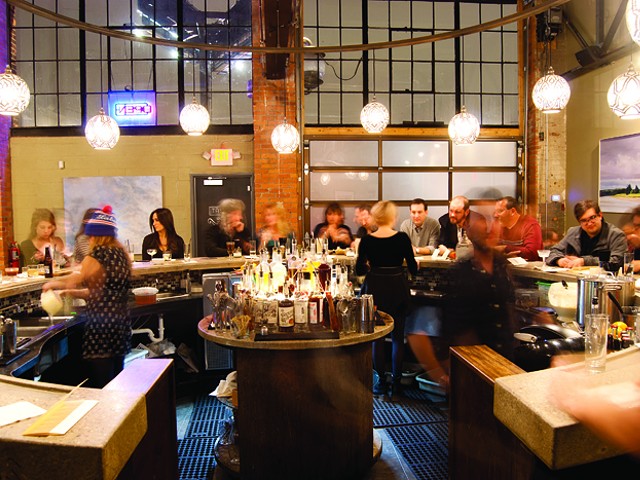As more and more metro Detroiters flock to places like the Oakland and Wright and Co. for craft cocktails artfully prepared by mixologists with perfect beards, there's a class of Detroit bars that has been almost forgotten in this rush to elegance.
Abick's Bar
While the 5:01 p.m. crowd leaves Quicken Loans and walks over to Punch Bowl Social to share a giant, glass globe of booze and a game of ping-pong, Eric Lakeman wonders if he'll have to dip into his savings again to keep the doors open at Abick's Bar in Southwest Detroit.
Abick's is one of the last of a dying breed, a true neighborhood bar. It's also a member of Detroit's Century Club — bars that have been open in the city for more than 100 years.
It sits on a corner in a residential area, only a neon sign in the window sets it apart from the rest of the houses. Eighty years ago, the bar had huge plate glass windows in front, but according to Lakeman, after the Detroit riots in the 1960s, insurance companies mandated that bars had to remove large panes of glass. They were forced to brick them over and replace them with smaller, thicker glass blocks.
Lakeman will tell you he doesn't know as much of his bar's history as he should, but when you talk to him, his knowledge flows like the draft beer that pours out of the taps at his back bar, which was installed by Stroh's Brewery and is complete with Tiffany glass light above.
If you get him talking long enough, he'll show the photos of numerous members of his family who worked the bar over the years. If you're really lucky, you might even get him to tell you about the secret hatch in the ladies room where he found a few Prohibition-era liquor bottles or the four barrels of liquor he found below his building. He says they are three-quarters full and almost certainly from the years alcohol was outlawed in the United States.
Abick's is a Detroit gem. It's also empty most of the time.
"We are doing what we can," Lakeman said. "It gets tough. There are some times at the end of the month you are looking at your ledger and you just have to sigh."
But Lakeman keeps on. He's got to. It's in his blood. Abick's has been in Lakeman's family for six generations. It was handed down to him from his grandmother, Manya Abick-Soviak, who tended bar almost until the day she died at age 91.
"This bar is our family," Lakeman said. "Not just family in terms of blood, but the family that comes in here. Our customers are our family. And I know a lot of places say that, but here they really are. People come here to visit. We've had everything from weddings to wakes here. There have been more babies crawling around on that pool table out there than you can shake a stick at because this is our family."
Times aren't easy. Abick's gets business from historic bus tours that feature some of the oldest bars in Detroit, but Lakeman says he also credits other bar owners as well, as word-of-mouth is one of his most effective marketing tools. And he passes it on, reminding customers to go check in on Melissa at the Carbon Club and Mary at the Two Way Inn.
He knows it's not easy, but he doesn't care. His family knows what it takes to persevere.
"Maybe I'll have to eat Spam and eggs for awhile," he says. "But come and check on us in five years. We've been here since 1907. There aren't many places that can say that."
Lakeman says that staying power is important and rare, and not something that many places in "New Detroit," will experience.
"In five years, how many fucking quail egg and kale burgers are you going to have here? You need more than glitter and flash," he says. "You need people who give a shit, not people who are just pulling in to make some money."
So for now, Lakeman is doing his thing. He's visiting with his family of customers, he's planning his bar's biggest event, an auction that raises money for children with leukemia (it's on March 11), and doing what he can to make that family of customers a little bigger.
Oh, yeah, and if you go, don't mind the dog. That's just Shadow, he barks at most of the newcomers.
The Two Way Inn
Mary Aganowski has a similar story, but different in its own ways.
Aganowski owns the Two Way Inn, which opened in 1876 and is Detroit's oldest bar. Nestled sleepily on the corner of Nevada and Mount Elliott streets, the Two Way Inn has the distinction of being the oldest bar in the city to continually serve alcohol, even during Prohibition.
"I remember talking with the woman who owned it before my dad bought the bar," Aganowski says. "I asked her how the bar stayed open during Prohibition and she said, 'Well, there was a dentist who rented the upstairs.' As a girl, I just figured he helped pay the rent."
Years later, Aganowski learned that there were certain people, namely doctors and dentists, who would write prescriptions for medicinal alcohol.
"They would write prescriptions for, like, four shots of whiskey an hour," she says. "Isn't that wild?"
Agnowski's father bought the bar in 1973, when she was 17. She's been working and running things there ever since. In the 43 years that have passed, she says much has changed.
"The neighborhood changed a lot," she says. "It used to be so walkable. The seniors would drink until 2 a.m. and then walk right on out, turn the corner, and wave goodbye and say, 'See you tomorrow.' You can't do that here anymore."
Despite changes, much remains the same.
"The people don't change much. About every 10 years a new group rolls in. Some of the older people don't come in as much, and those that are a bit younger start coming more. You make bonds with these people. It's like a family."
Tom's Tavern
In January 2014, some thieves drove a truck into the back wall of Tom's Tavern. They stole some booze and caused a great deal of damage.
It wouldn't have been out of the realm of possibility for the place to close its doors.
Located on a stretch of Seven Mile Road near Washburn Street, it's not in a great part of town. It's been a bar for 88 years; in the last few of decades, it's seen several break-ins, damage from scrappers, and even a devastating fire.
But owner Ron Gurdjian preserveres.
"No. Never," he says when asked if he thought of shuttering after the 2014 break-in. "That kind of stuff is going to happen. But we deal with it."
At 76, Gurdjian might be the most senior bartender in Detroit. He stands behind the bar at Tom's, which is fabulously slanted, and sells beer to an abnormal amount of people, considering the sketchiness of the neighborhood.
The bar was originally opened in 1928, by Tom Lucas. Gurdjian said he frequented the bar as a kid, but never really saw himself as a bar owner.
Until Lucas died.
"That's when I realized I didn't want Tom's to go away. And here we are, still going in 2016," says Gurdjian.
He credits his loyal patrons for his bar's success in remaining open for so long.
"Without them, I'd be dead in the water," he says. "This place would have been closed long, long ago."
The bar is gearing up for its biggest night of the year, its annual Babe Ruth party, which celebrates the birthday of the legendary baseball player (Feb. 6). Gurdjian says the party will pack the bar, which, given its size, doesn't seem like much of a feat.
"You'll see," he says. "It's going to be one hell of a party."






